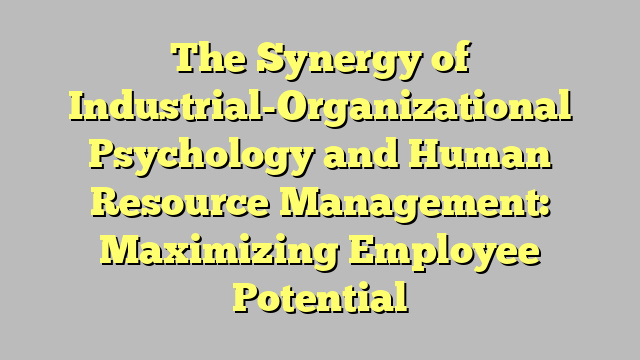The Synergy of Industrial-Organizational Psychology and Human Resource Management: Maximizing Employee Potential
The Synergy of Industrial-Organizational Psychology and Human Resource Management: Maximizing Employee Potential
Introduction
Industrial-Organizational Psychology (I-O Psychology) and Human Resource Management (HRM) are two fields that have a natural synergy when it comes to maximizing employee potential. Both disciplines focus on understanding and optimizing human behavior in the workplace, but they approach it from different angles. By combining the insights and strategies from I-O Psychology and HRM, organizations can create a more productive and fulfilling work environment for their employees.
The Role of Industrial-Organizational Psychology
I-O Psychology is a branch of psychology that applies psychological principles and theories to the workplace. It focuses on understanding individual and group behavior in organizations and using that knowledge to improve productivity, efficiency, and overall well-being. I-O psychologists use various research methods, including surveys, interviews, and experiments, to gather data and analyze it to make evidence-based recommendations.
One of the key areas of focus in I-O Psychology is employee selection and assessment. By using scientifically validated methods, I-O psychologists can help organizations identify the most suitable candidates for a job and predict their potential for success. This ensures that the right people are placed in the right roles, leading to higher job satisfaction and performance.
I-O Psychology also plays a crucial role in employee training and development. By understanding the learning processes and individual differences, I-O psychologists can design training programs that are tailored to the specific needs of employees. This not only enhances their skills and knowledge but also boosts their confidence and motivation.
The Role of Human Resource Management
HRM, on the other hand, focuses on managing the human resources of an organization. It involves activities such as recruitment, selection, training, compensation, and performance management. HRM professionals are responsible for ensuring that the organization has the right people with the right skills in the right positions.
One of the key functions of HRM is talent acquisition. HRM professionals work closely with I-O psychologists to develop job descriptions, conduct interviews, and assess candidates. By leveraging the expertise of I-O psychologists, HRM professionals can make more informed decisions about hiring and ensure that the organization attracts and retains top talent.
HRM also plays a crucial role in employee engagement and retention. By creating a positive work environment, providing opportunities for growth and development, and recognizing and rewarding employees’ contributions, HRM professionals can foster a sense of loyalty and commitment among employees. This leads to higher job satisfaction, lower turnover rates, and increased productivity.
The Synergy between I-O Psychology and HRM
When I-O Psychology and HRM work together, they create a powerful synergy that maximizes employee potential. By combining the insights from I-O Psychology with the strategic implementation of HRM practices, organizations can create a work environment that promotes employee well-being, engagement, and performance.
For example, I-O psychologists can help HRM professionals design effective performance appraisal systems. By understanding the principles of motivation and feedback, I-O psychologists can develop appraisal processes that are fair, transparent, and focused on continuous improvement. This not only helps employees understand their strengths and areas for development but also provides them with the necessary support and resources to enhance their performance.
Another area where the synergy between I-O Psychology and HRM is evident is in leadership development. I-O psychologists can assess the leadership potential of employees and provide feedback and coaching to help them develop their skills. HRM professionals can then create leadership development programs that are aligned with the organization’s goals and values, ensuring that the right leaders are in place to drive success.
The Benefits of the Synergy
By leveraging the synergy between I-O Psychology and HRM, organizations can reap numerous benefits. Firstly, they can improve employee satisfaction and well-being. By understanding the factors that contribute to job satisfaction and implementing HRM practices that support employee well-being, organizations can create a positive work environment that fosters happiness and fulfillment.
Secondly, organizations can enhance employee engagement and productivity. By aligning HRM practices with the principles of motivation and engagement identified by I-O Psychology, organizations can create a work environment that encourages employees to give their best. This leads to higher levels of productivity, creativity, and innovation.
Lastly, organizations can improve their bottom line. Research has consistently shown that organizations with engaged and satisfied employees outperform their competitors in terms of financial performance. By maximizing employee potential through the synergy of I-O Psychology and HRM, organizations can gain a competitive advantage and achieve sustainable growth.
Conclusion
The synergy between Industrial-Organizational Psychology and Human Resource Management is a powerful combination that can help organizations maximize employee potential. By leveraging the insights and strategies from I-O Psychology and implementing them through HRM practices, organizations can create a work environment that promotes employee well-being, engagement, and performance. The benefits of this synergy are numerous, including improved job satisfaction, increased productivity, and enhanced financial performance. Therefore, organizations should recognize the value of this synergy and invest in both I-O Psychology and HRM to unlock the full potential of their employees.

